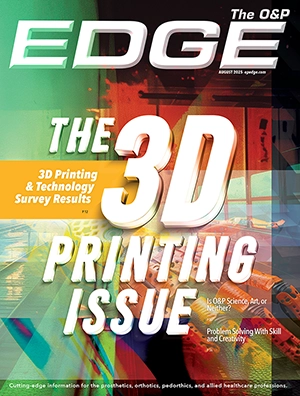The Orthotic and Prosthetic Assistance Fund (OPAF) offers the following information from H-Net (http://www.h-net.org/about/) as a public service announcement (PSA), in fulfillment of OPAF’s official representation of O&P in community and philanthropic circles. OPAF aims primarily to enable individuals with physical disabilities – especially those served by members of the U.S. orthotics and prosthetics community – to enjoy the rewards of personal interaction, physical fitness, and social interaction. Complete information about OPAF is available at http://www.opfund.org.
—
CALL FOR ABSTRACTS FOR THE 2004 “INNOVATIVE APPROACHES TO ELIMINATE RACIAL AND ETHNIC HEALTH DISPARITIES CONFERENCE”, SEPTEMBER 16, 2004
LOCATION: THE MICHIGAN LEAGUE AT THE UNIVERSITY OF MICHIGAN – ANN ARBOR, MI. Keynote Speakers: Nathan Stinson, Jr., Ph.D, MS – Director of the Office of Minority Health, US Department of Health and Human Services; Kimberly Dawn Wisdon, MD,MS – State of Michigan Surgeon General, Michigan Department of Community Health; and John R. Lumpkin, MD – Vice President, Robert Wood Johnson Foundation.
Background:
Health indicators such as life expectancy and infant mortality have improved for most Americans but people of color continue to experience a disproportionate burden of preventable disease, disability, and death.
It is evident that achieving better health does not depend on health services alone, but requires comprehensive strategies that affect the social, environmental, cultural, and economic determinants of health.
One of these strategies is sponsoring this conference which will: (1) Highlight Best Practice models to eliminate racial and ethnic health disparities; (2) Provide an opportunity for participants to learn culturally approaches healthcare delivery strategies; and (3) Mobilize participants to advocate for health policies to eliminate racial and ethnic health disparities.
By the end of this conference, participants will be able to 1) Utilize successful models, strategies, and policies to improve the health of racial and ethnic populations in their organization or community; (2)Apply culturally appropriate strategies to improve the health of racial and ethnic populations in their organization or community;(3)List key resources and contacts to assist their organization in the implementation of best practice strategies to improve the health of racial and ethnic populations;and (4) Demonstrate how to partner with local community organizations to improve the health of racial and ethnic populations in their community.
Conference and Abstract Topics:
Racial and Ethnic Health Disparities reduction “best practice” models, policies and research from the following community sectors: health systems and hospitals, government, community/grassroots, faith community, universities and colleges, schools (K-12), managed care organizations, media/entertainment and the Arts, business/industry, and organized unions.
Abstract Application:
Abstracts must be limited to 250 words. Please share in them your name, occupation, organization or university affiliation, address, city, state, zip, phone, fax and email address. Let us know whether you are submitting an abstract for either a workshop presentation or a poster presentation. Also, list three abstract objectives.
Please include with your abstract a brief biographical sketch (1 page maximum). Abstracts will be evaluation upon the substance and clarity of content, relevance to conference goals and objectives, and scholarly quality. Abstracts may be submitted for an oral (60 minute)presentation, poster presentation, or tbe included in the conference program. A limited number of scholarships will be available to selected presenters to cover travel expenses.
Conference Abstract/Presenter Objectives: (1) Abstracts/Speakers will describe their successful, culturally appropriate best practice strategies that improved the health of racial or ethnic populations in their community; (2)Abstracts/Speakers will explain the best practice procedure, including techniques on partnering and identifying resources;
(3) Speakers will provide best practice strategy outcomes.
Submit your abstract application and required attachments by June 28,
2004 to the contact address below.
This event is sponsored by the University of Michigan Health System’s Program for Multicultural Health and the African American Health Institute in collaboration with several other organizations. Conference
website: www.med.umich.edu/multicultural
Diana Urbina, Program Assistant
Program for Multicultural Health
University of Michigan Health System
2600 Green Road, Suite 150C
Ann Arbor, MI 48105-0792
734-615-1404



